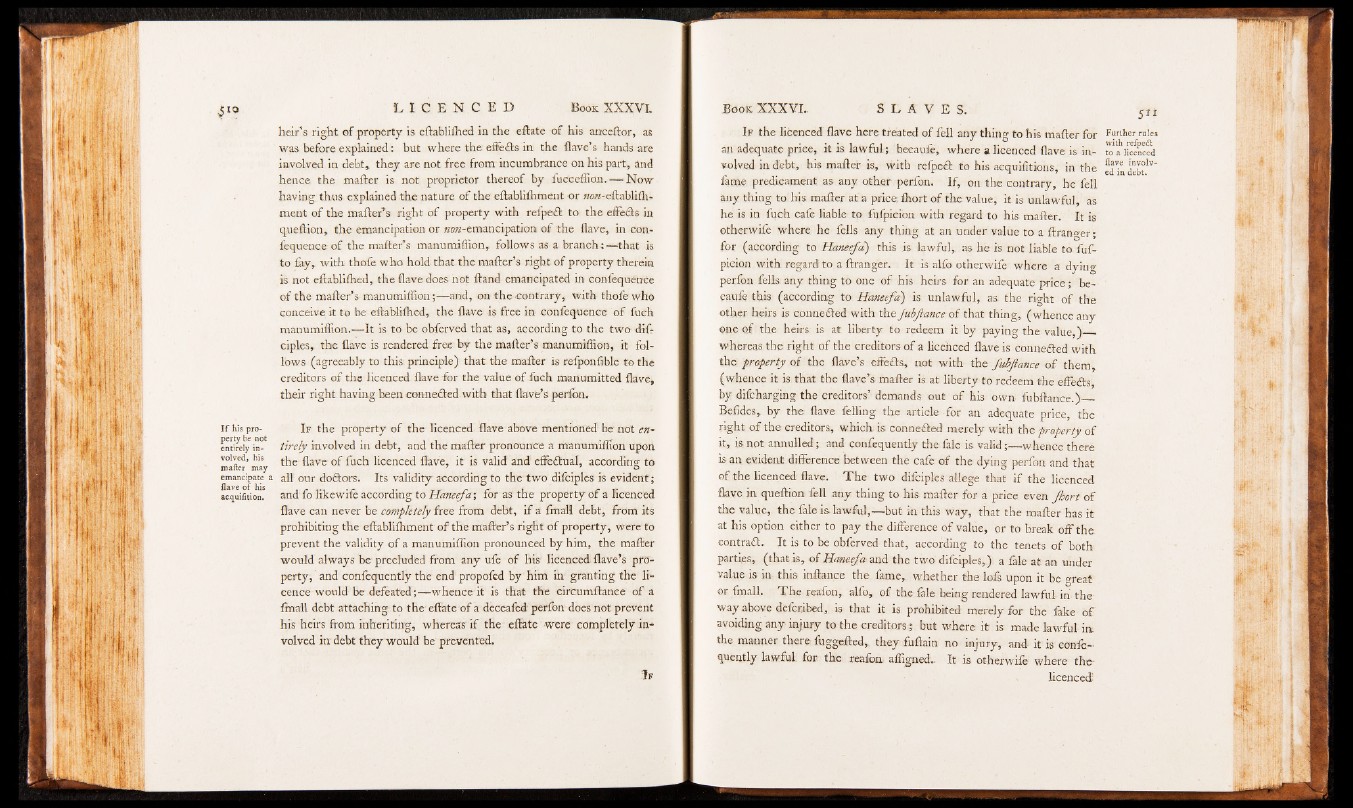
heir’ s right of property is eftablifhed in the eftate of his anceftor, as
was before explained: but where the effects in the flave’s hands are
involved in debt, they are not free from incumbrance on his part, and
hence the matter is not proprietor thereof by fuCceffion. — N ow
having thus explained the nature of the eftablifhment or «o»-effeblifh-
ment of the matter’ s right of property with refpedt to the effedfe in
queftion, the emancipation or «o«-emancipation of the flave, in con-
fequence of the matter’ s manumiflion, follows as a branch: — that is
to fay, with thofe who hold that the matter’s right of property therein
is not eftablifhed, the flave does not ftarnd emancipated in confequen'Ce
of the matter’ s ma-numiffion;— and, on the-Contrary,- with thofewho
conceive it to be eftablifhed, the flave -is free in confcqucnee of fuck
manumiflion.— It is to be obferved that as, according to the two- dif-
ciples, the flave is rendered free by the matter’s manumiflion, it follows
(agreeably to this; principle) that the matter is rclpotifible to the
creditors of the licenced Have -for the value of fuch manumitted flave,
their right having been connected with that flave’s perfon.
If the property of the licenced flave above mentioned be not entirely
involved in debt, and the matter pronounce a manumiflion upon
the Have of luch licenced flave, it is valid and effectual, according to
all our doftors. Its validity according to the two difciples is evident;
and fo likewife according to Haneefa; for as the property o f a licenced
flave can never be completely free from debt, if a fmall debt, from its
prohibiting the ettabl'ifhment of the matter’ s right of property, were to
prevent the validity of a manumiflion pronounced by him, the matter
would always be precluded from any ule of his' licenced flave’s property,
and confequently the end propofed by him in- granting the licence
would be defeated ;— whence it is that the circumftanee of a
fmall debt attaching to the eftate of a deceafed perfon does not prevent
his heirs from inheriting, whereas if the effete were completely involved
in' debt they would be prevented.
I f his property
be not
entirely involved,
his
matter may
emancipate a
flave o f his
acquisition.
If the licenced flave here treated of fell any thing to his matter for Further rules
an adequate price, it is lawful; becaufe, where a licenced flave is in- K.^iklncfd
volved in debt, his matter is, with refpeft to his. acquifitions, in the edVindeb°1V*
fame predicament as any other perfon. If, on the contrary, he fell
Uny thing to bjs matter at a price fhort of the value, it is unlawful, as
he is in fuch cafe liable to fufpicion with regard to his matter. It is
otherwife where he fells any- thing at an under value to a ftranger;
for (according to Haneefa) this is lawful, as. he is not liable to fof-
picion with regard to a ftranger. It is alfo otherwife where a dying
perfon fells any thing to one of his heirs for an adequate price; be-
Pftufe this (according to Haneefa) is unlawful, as the right o f the
other heirs is conne&ed with the Jubfiance of that thing, (whence any
one of the- heirs is at liberty to redeem it by paying the value,)_
whereas the right of the creditors o f a licehced Have is connected with
the property of the flave’ s eiFefts, not with the. fubflance o f them,
(whence it is that the flave’s .matter is at liberty to redeem the effefts,
by difeharging the creditors’ demands out of his own- fubttance.)_
Befides, by the flave felling the article for an adequate price, the
right of the creditors, which is connected merely with the property of
it, is not annulled; and confequently the fale is valid;— whence there
is an. evident difference between the cafe of the dying perfon and that
of the licenced flave. T h e two difciples allege that i f the licenced
flave in queftion fell any thing to his matter for a price even fhort of
the value, the fale is lawful,— but in this way, that the matter has it
at his option either to pay the difference o f value, pr to break off the
contrail. It is to be obferved that, according to the tenets of both
parties,, (that is, of Haneefa and the two difciples,). a fele at an under
value is in this inftance the feme, whether the lofs upon it be o-reat
or fmall. T h e reafon, alfo, of the fele being rendered lawful- in the
way above deferibed, is that it is prohibited merely for the fake of
avoiding any injury to the creditors; but where it is made lawful in.
the. manner there fuggetted,. they fuftaiti no injury, and- it is ccrrtfe-
quently lawful for the reafon affigned- It is otherwife where thelicencedi